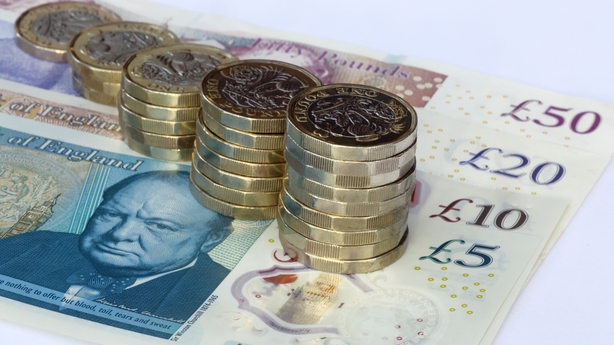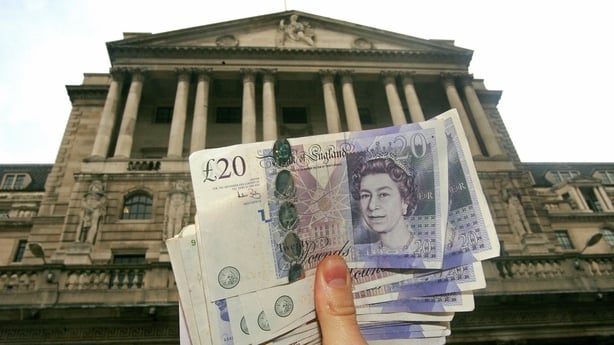The Bank of England raised interest rates by a further quarter of a percentage point today but said it was ready to act "forcefully" to stamp out dangers posed by an inflation rate heading above 11%.
A day after the US Federal Reserve raised rates by the biggest hike since 1994 with a 75 basis-point increase, the Bank of England stuck to its more gradual approach as it warned that Britain's economy would shrink in the April-June period.
The nine-strong Monetary Policy Committee voted 6-3 for the 25 basis-point hike in Bank Rate to 1.25%, the same breakdown as in May with the minority voting for a 50 basis-point increase.
The British benchmark interest rate is now at its highest since January 2009.
It was the fifth time that the Bank of England has raised borrowing costs since December when it became the first major central bank to tighten monetary policy after the onset of the Covid-19 pandemic.
But some critics say it is moving too slowly to stop the rise in inflation from becoming entrenched in pay deals and inflation expectations, damaging the economy over the long term.
"The scale, pace and timing of any further increases in Bank Rate will reflect the Committee's assessment of the economic outlook and inflationary pressures," the Bank of England said.
"The Committee will be particularly alert to indications of more persistent inflationary pressures, and will if necessary act forcefully in response," it added.
The Bank of England dropped its guidance from May when it said most MPC members believed "some degree of further tightening in monetary policy may still be appropriate in the coming months".
Committee members Catherine Mann, Jonathan Haskel and Michael Saunders favoured a bigger, 50 basis-point increase, as they did in May.
Economists polled by Reuters had forecast a 6-3 vote to raise rates to 1.25% but investors increased their bets on a bigger move in recent days, with sterling plunging against the US dollar and after reports that the Fed was considering its rare 75 basis-point move.

The Bank of England noted that the market path for British interest rates had risen materially since the May meeting, even though there had been relatively little news since then.
Central banks around the world are trying to show that they can contain inflation which is hitting levels not seen in decades, pushed up by the reopening of the global economy after the Covid-19 pandemic and then by Russia's invasion of Ukraine.
As well the Fed's move last night, last week the European Central Bank said it would push up borrowing costs in July for the first time since 2011 and would do so again in September, possibly by 50 basis points.
Earlier today, the Swiss National Bank raised its policy interest rate for the first time in 15 years by half a percentage point in a surprise move and Hungary's central bank unexpectedly raised its one-week deposit rate.
The Bank of England is raising rates even though it has warned of a sharp slowdown ahead for Britain's economy.
UK consumer price inflation hit a 40-year high of 9% in April, more than four times the Bank of England's 2% target, and the central bank today raised its forecast to show it peaking slightly above 11% in October when energy bills go up again.
Britain's surge in inflation looks set to last longer than in many other economies, partly due to the delayed impact of its mechanism for domestic power tariffs but also because of the hit to trade from the country's departure from the European Union.
A chronic lack of workers to fill vacancies is worrying the Bank of England because it could lead to a jump in wages and turn the inflation surge into a longer-lasting problem.
A fall in the value of the pound in recent weeks, caused largely by the rise in interest rate expectations in the US and the euro zone, threatens to add to the inflation pressure in Britain.
The Bank of England said sterling had been "particularly weak against the US dollar".

It also downgraded its short-term forecasts for Britain's economy, saying it would shrink by 0.3% in the second quarter of 2022. It had predicted in May that there would 0.1% growth over the three months.
The forecast for a contraction in growth in the current quarter came despite the latest measures announced in late May by finance minister Rishi Sunak to help households hit by the jump in inflation.
The Bank of England said the measures could boost economic output by 0.3% and pushed up inflation by 0.1 percentage points in the first year.
Sterling rose slightly today, recouping losses earlier in the day after the Bank of England raised interest rates by 25 basis points and confounded forecasts by some market participants of a bigger hike to fight soaring inflation.
The pound was last up 0.29% on the day at $1.2212 against the dollar amid volatile markets, compared to $1.2165 just before the Bank of England decision.
Against the euro, sterling rose 0.59% to 85.34 pence.
The benchmark FTSE index fell 2.58%, while 10-year UK government bond yields rose to 2.6%.
Sterling has weakened around 11% against a robust dollar since the start of the year given the grim outlook for the economy and political instability in Britain.

